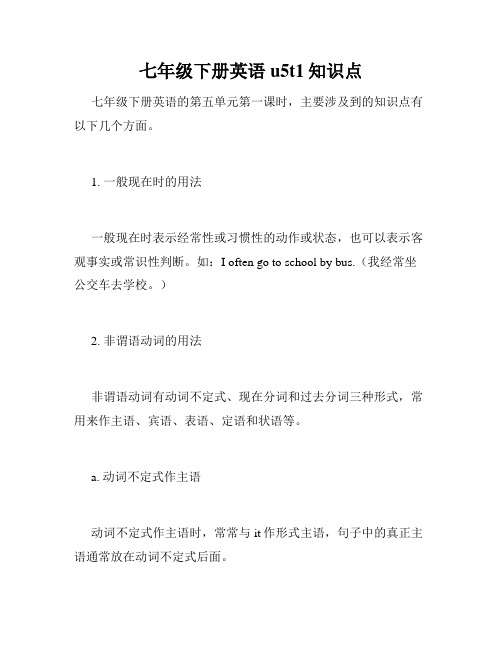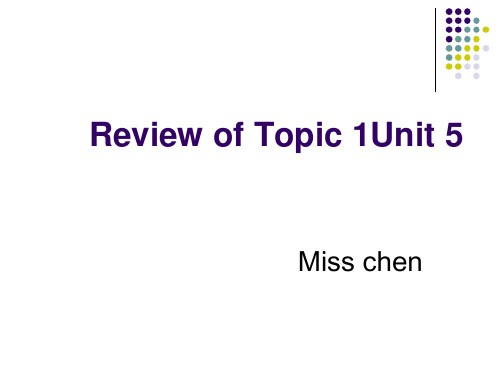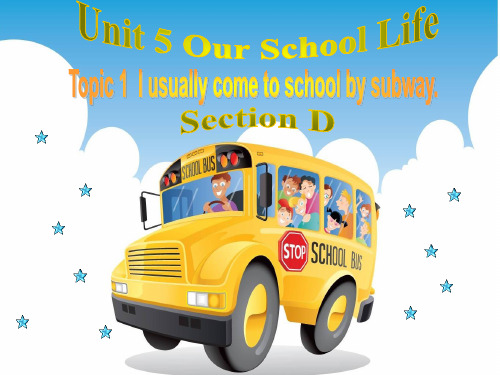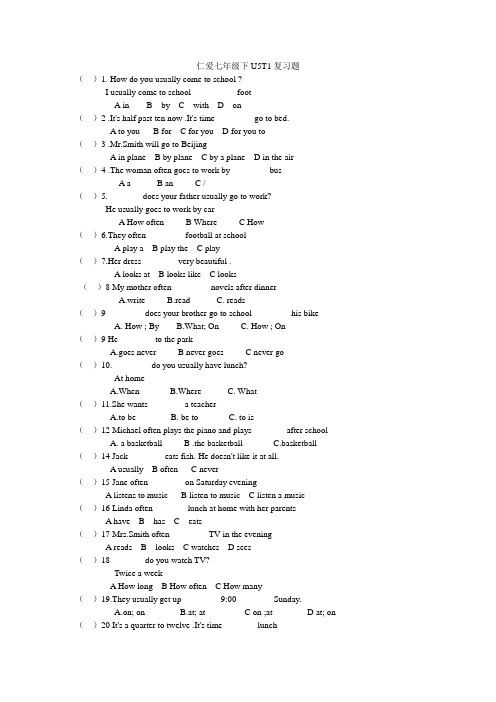7年级下册U5T1复习
七年级下册英语u5t1知识点

七年级下册英语u5t1知识点七年级下册英语的第五单元第一课时,主要涉及到的知识点有以下几个方面。
1. 一般现在时的用法一般现在时表示经常性或习惯性的动作或状态,也可以表示客观事实或常识性判断。
如:I often go to school by bus.(我经常坐公交车去学校。
)2. 非谓语动词的用法非谓语动词有动词不定式、现在分词和过去分词三种形式,常用来作主语、宾语、表语、定语和状语等。
a. 动词不定式作主语动词不定式作主语时,常常与it作形式主语,句子中的真正主语通常放在动词不定式后面。
如:It's important to learn English well.(学好英语很重要。
)b. 现在分词作定语现在分词作定语时,用来修饰名词或代词,表示被修饰词正在进行的动作或状态。
如:She saw a running dog in the park.(她在公园里看到一只跑着的狗。
)c. 过去分词作表语过去分词作表语时,说明主语的状态或特征,常常与be动词连用。
如:I am interested in English.(我对英语很感兴趣。
)3. 疑问句的构成和回答疑问句的构成通常使用助动词do或does,do通常用于一般现在时,does用于第三人称单数。
回答疑问句时,一般使用yes或no。
如:Do you like swimming?(你喜欢游泳吗?)Yes, I do. / No, I don't.(是的,我喜欢。
/ 不,我不喜欢。
)4. 情态动词情态动词用来表示说话人的情感、态度或看法,常常用在情态动词后跟动词不定式的形式中。
如:I can swim.(我会游泳。
)以上就是七年级下册英语U5T1知识点的内容。
在学习这些知识点的同时,还需要多进行实践、多听多说多读多写,才能够使英语学习更加有效。
七下英语期末复习U5T1,T2,T3

Review of Topic 1
1.步行去上学
go to school on foot = walk to school
2.坐地铁回家
go home by subway = take the subway home
3.骑自行车去上学
go to school by bike= ride a bike to school
Thursday
Friday
数学 生物 英语
Saturday
政治 历史
Chinese math
地理
English politics history
音乐 美术 体育
geography biology music
art
P.E.
Patterns:
1.
I think you must like English very much. 我想你必定很喜欢英语。 *must 必定(表肯定的猜测) can’t 不可能 (表否定的猜测) --What do you think of it? -- I don’t like it. It’s a little difficult.
--你认为它怎么样? --我不喜欢它。它有点难。
2.
•What do you think of…? = How do you like..? •你认为…怎么样?
• a little 1)有点 + 形容词
eg
有点容易 a little easy
3. help each other
互相帮助
2) 一点儿 + 不可数名词 eg. 一点儿水 a little water
7.计算数学题
work on math problems
七年级下u5t1复习课件

Functions
句型转换。(每空一词)(5分) • 51. The old man always walks to the shop. (反义句) • The old man _____ _____ to the shop. • 52. Mike often goes to the zoo by bus. (改为同义句) • Mike often _____ a _____ to the zoo. • 53. Mrs. Read goes shopping three times a week. (对画线部分提问) • _____ _____ does Mrs. Read go shopping? 54. I usually read books on Sundays. (画线部分提问) • _____ do you usually _____ on Sundays? 55. Maria often visits the Great Wall. (改为一般疑问 句) • _____ Maria often _____ the Great Wall?
1. Listen to the sentences and fill in the blanks.
A B
E E
C
D
(A)1.Miss Yang _______ always goes to Wuhan by bus. (D)2.Mr. Smith seldom goes to Nanjing ________. by train sometimestakes the _________ never (E )4.Ms. Wang ____________ visits the Great Wall. (C)5.He often ___________ drives a car to the park for a picnic on Sundays.
七年级英语下册u5t1知识点总结

七年级英语下册u5t1知识点总结Unit 5 Lesson 1是七年级英语下册的一节课,本课时主要介绍了“Can you help me?”这一话题,重点讲解了如何用英语请求帮助的表达方式,同时还介绍了问路和指路的相关词汇和用法。
以下是本节课中需要掌握的知识点:1. Can you help me?这是本节课的重点内容,其主要涉及到几个方面的知识点,如礼貌用语、请求方式、动词的使用等。
在表达请求帮助时,我们应该使用礼貌用语,即“Can you help me?”(你能帮我一下吗?)。
其中,can是一种情态动词,用于表示请求或提供帮助,表示一种客气的方式,我们可以在外出旅游、买东西、找人帮忙等情况下使用。
2. Asking for directions当我们在路上迷路时,要想得到他人的指路帮助,就需要学会用英语进行问路和指路。
问路时应使用What’s the way to...(去...怎么走?)的句型,例如:- What’s the way to the library?(去图书馆怎么走?)在指路时应使用Turn left/right (at ...),go straight (on ...),take the first/second (on ...)等指示性语言,例如:- Turn left at the first corner.(在第一个拐角处向左转。
)- Go straight on for 2 blocks.(直走两个街区。
)3. Vocabulary除了以上两个方面的知识点,本节课还介绍了一些问路和指路时需要用到的词汇,例如:- road(道路)- street(街道)- block(街区)- turn(转弯)- corner(拐角)- cross(穿过)以上这些单词是我们在询问路线和指示方向时需要用到的重要词汇。
总结:以上是七年级英语下册U5T1的知识点总结。
本节课主要涉及了“Can you help me?”这一话题,学生需要掌握礼貌用语、请求方式、动词的使用等方面的知识点。
(完整版)仁爱七年级下U5T1复习题

仁爱七年级下U5T1复习题()1. How do you usually come to school ?I usually come to school ________ footA inB byC withD on()2 .It's half past ten now .It's time ________ go to bed.A to youB forC for youD for you to()3 .Mr.Smith will go to Beijing ________A in planeB by planeC by a planeD in the air()4 .The woman often goes to work by ________ busA aB anC /()5.________does your father usually go to work?He usually goes to work by carA How oftenB WhereC How()6.They often ________ football at schoolA play aB play theC play()7.Her dress ________very beautiful .A looks atB looks likeC looks()8 My mother often ________ novels after dinnerA.writeB.readC. reads()9 ________ does your brother go to school ________ his bikeA. How ; ByB.What; OnC. How ; On()9 He________ to the parkA.goes never B never goes C never go()10. ________ do you usually have lunch?At homeA.WhenB.WhereC. What()11.She wants________ a teacherA.to beB. be toC. to is()12 Michael often plays the piano and plays________after schoolA. a basketball B .the basketball C.basketball()14 Jack________ eats fish. He doesn't like it at all.A usuallyB oftenC never()15 Jane often ________on Saturday eveningA listens to musicB listen to musicC listen a music()16 Linda often________lunch at home with her parentsA haveB hasC eats()17 Mrs.Smith often ________ TV in the eveningA readsB looksC watchesD sees()18________do you watch TV?Twice a weekA How longB How oftenC How many()19.They usually get up ________ 9:00________ Sunday.A.on; onB.at; at C on ;at D at; on ()20 It's a quarter to twelve .It's time________lunchA haveB for haveC to have()21 Lingling takes the subway home at half ________fourA onB toC pastD in()22 The students often play soccer ________the playground after schoolA forB ofC on()23 All of them ________in the river nowA.is swimmingB.are swimming C to swimming()24 .________is this coat ?It's 80 yuanA How oldB How muchC How many()25. Li Lei likes________things. Now he ________a modelA make;makeB makes; is makingC making; is making()26 Look,they________on the roadA runB are runingC are running()27 Listen,Mr.Zhang________an English songA is singingB singsC are singing()29.How long can I________ the book?Two weeksA borrowB keepC lendD take()30 Maria with her parents ________ TV on weekendsA watchB watchesC watching()31 Do you want________basketball with me this afternoon?A playsB playingC playD to play()32 It's________good news.I'm very glad to hear that he will come hereA a B.an C the D a piece of()35 My father is talking ________ my teacherA withB inC at()36 My mother often ________ at six o'clockA goes homeB go homeC goes to home()38 ________ PE. Lessons do you have every week?TwoA How manyB How muchC How often()40 What class are they having ?They are having an ________classA EnglishB ChineseC history()41 What time________ the sports meeting over?A areB isC does()43 Jim is________a book under the treeA readingB watchingC lookingD seeing()44.Look, this coat is nic e.________A.Why not try on it B Why not try it on C Why not trying it on()45What time ________ the English class begin.A doB doesC is()47 . ________do you think of the movie ?It's very interesting .I want to see it againA HowB whatC WhenD Where()48 .What do you ________ English.?It's too difficultA thinkB think ofC like()49 Here is a letter ________ youA inB toC fromD for()50 Thank you for ________ herA helpB helpingC to help()51 Mike can't ________ his pen .And we are________itA look for;findB finds;looking forC find;looking()52________does Maria meet her friends?Seldom .A How longB How oftenC What time()53 My teachers ________ me.A are friendly toB is friendly toC are friendly for()54 The girl ________ English ________ her classmatesA speaks also ;withB speak also; withC also speaks; with()55 Those are your socks .Please________.A put on itB put on themC put them on()56________do you usually do on weekends?I play basketballA WhenB WhatC How()57 What are you ________ ?I'm ________ my English bookA looking for;findingB doing;looking forC doing;finding二.根据汉语提示完成句子1 你也一样__________________________________________________2吃午饭的时间到了__________________________________________________3你通常怎样到学校?__________________________________________________4李英是坐飞机去的北京吗?__________________________________________________ 5Sally Green 经常步行去上班__________________________________________________ 三.用所给单词的适当形式填空1 How about ________ (go)to school by subway today?2 Maria usually ________ (go) to school on foot3The early bird ________ (catch) the worm4How does Jim usually ________ (go) to school?5 Let me________ (tell) you the way to the school6 Lily often helps her parents ________ (do) some housework7 Do you want to go ________ (swim)8 Please come and ________ (watch) the game9 A few ________ (girl) are singing under the trees10 Don't ________ (swim) in rivers!11 Here ________ (be) my good friends from China12 How many history ________ (lesson)do you have every week?13 A lot of ________ (sheep) are eating grass on the hill14 They are ________ (have) a music class四.句型转换1 I often help my mother.(改为一般疑问句)________________________________________________________2 He usually goes to the park by bike (对划线部分提问)________________________________________________________3 They usually walk to school (用she做主语改写句子)________________________________________________________4 They go to see their grandmother once a week(对划线部分提问)________________________________________________________5 Do you usually come here by bus ?(改写同义句)________________________________________________________6 I'm doing my homework now(对划线部分提问)________________________________________________________7.We often play soccer on the playground after school(改为一般疑问句)________________________________________________________8. School is over at about 3:50 p.m(对划线部分提问)________________________________________________________五.用适当的介词填空1 His sister often goes ________ work________ bus .2 My father usually gets up________ 6:00 ________the morning.5 Mary comes home________ foot6 They usually have lunch ________ school7 We can read books ________ our school library六.中考链接()1 He goes to school ________ every dayA by a bikeB by bikeC on bike()2 Look! The boys ________ happily in the riverA swimB swimsC are swimming()3 Our Chinese teacher ________ Mr.LeeA is talking toB talk toC talks()4 Can I help you?Yes ,I ________a penA findB am findingC am looking for()6 How many ________ are you learning? ------NineA subjectB subjectsC some subjects()7 She doesn't like apples ________A. very much B at all C a little()8 It's a fine day .What about ________out for a walk?A wentB goC going()9 My English teacher is very friendly________me.I like her very muchA withB toC at。
七年级下册英语U5T1SA知识点

七年级下册英语U5T1SA知识点七年级下册英语U5T1SA(Unit 5 Topic 1 Section A)是英语课程中非常重要的一部分。
本文将详细地介绍U5T1SA的知识点,帮助学生更好地掌握这一课程内容。
一、单词1. countryside:乡村2. factory:工厂3. city:城市4. pollution:污染5. environment:环境6. traffic:交通7. noise:噪音8. cycle:骑自行车9. environment-friendly:环保的10. recycle:回收二、短语1. in the countryside:在乡村2. go fishing:去钓鱼3. go cycling:去骑自行车4. take a walk:散步5. pick up litter:捡垃圾6. make a fire:生火7. take photos:拍照片8. keep the environment clean:保持环境干净9. recycle rubbish:回收垃圾10. save energy:节约能源三、语法1. be动词的用法例如:I am from China.(我来自中国。
)2. 一般现在时的用法例如:He walks to school every day.(他每天步行去学校。
)3. 一般过去时的用法例如:She visited her grandparents last weekend.(她上个周末去看望了她的祖父母。
)四、重点句型1. Where are you from?(你来自哪里?)2. What do you think of the city?(你觉得这个城市怎么样?)3. I think the traffic is too busy.(我认为这里的交通太拥挤。
)4. Last weekend, I went cycling in the countryside with my friends.(上个周末,我和我的朋友们去了乡村骑自行车。
七年级下册英语Unit5topic1课本知识点归纳讲解及练习题
七年级下册英语Unit5topic1课本知识点归纳讲解及练习题Unit 5 Topic 1 课本知识点归纳讲解及练习题Unit 5 Topic 1 是七年级下册英语教材中的一个重要话题,本文旨在对该话题的课本知识点进行归纳讲解,并提供一些练习题供同学们巩固所学知识。
一、课本知识点归纳讲解1. 形容词的比较级和最高级在本话题中,我们学习了形容词的比较级和最高级的用法。
比较级用于比较两个人或物的不同之处,最高级用于比较三个或三个以上的人或物之间的不同之处。
比较级的形式是在形容词后加上-er,最高级的形式是在形容词前加上the。
2. 月份和季节的表达我们学习了英语中表示月份和季节的词汇。
一月到十二月分别用January到December表示,而春天、夏天、秋天和冬天则用spring、summer、autumn和winter表示。
3. 喜好和讨厌的表达本话题中,我们学习了表达自己喜欢和讨厌某样东西的句型。
例如,I like swimming.(我喜欢游泳。
)和She hates math.(她讨厌数学。
)4. 询问和描述天气在本单元,我们学习了询问和描述天气的表达方式。
例如,What's the weather like today?(今天天气怎么样?)和It's sunny and hot.(天晴,很热。
)二、练习题1. 选择最佳答案( )1. --- _______ is your birthday? --- It's in June.A. WhereB. WhenC. What( )2. --- How do you like _______ soccer? --- I love it.A. playB. playingC. plays( )3. --- _______ is your favorite season? --- Autumn.A. WhatB. HowC. When( )4. --- _______ do you hate? --- I hate snakes.A. What other animalsB. What else animalsC. What other animal( )5. What's the _______ like in your city?A. weatherB. foodC. color2. 句型转换1. I am tall. (改为比较级)___________________________________________________________________2. Lily's birthday is in August. (改为一般疑问句)_____________________________________________________________ ______3. They love playing basketball. (改为否定句)_____________________________________________________________ ______4. What's the difference between spring and summer? (改为同义句)_____________________________________________________________ ______5. I hate swimming. (改为同义句)_____________________________________________________________ ______3. 完成句子1. ___ ___ your favorite month?2. How ___ do you ___ soccer?3. I love winter ___ it's very ___.4. What's your ___ ___, Jack?5. My sister ___ ___ swimming.三、答案解析1. 1. B2. B3. A4. C5. A2. 1. I am taller.2. Is Lily's birthday in August?3. They don't love playing basketball.4. What are the similarities and differences between spring and summer?5. I don't like swimming.3. 1. What's2. often, play3. because, cool4. favorite season5. enjoys, (going) swimming.通过对 Unit 5 Topic 1 课本知识点的归纳讲解以及练习题的提供,我们可以巩固我们在这个话题中所学到的知识。
7年级下册U5T1复习讲解
检查单词:自主检查→师友交流→师傅注意纠正学友发音
1.对…也一样 2.上课 3.走路,步行 4.乘公共汽车 5.在平日,在工作日 6.做某人的家庭作业 7.在某人的业余时间 8.去游泳 9.听… 10.在学校 11.去睡觉 12.打篮球 13.每周一次 14.吃午饭
仁爱英语七下U5T1知识点梳理
仁爱版英语七下U5T1知识点梳理Unit1 I usually come to school by subway一、重点单词详解1.gateLet’s meet at our school gate.2.交通工具词:bus/car/train/subway/plane/ship/boat3.频度副词:always,usually,often,sometimes,seldom,never句中位置:位于系动词be、助动词、情态动词(can, may, must等)之后,实义动词前。
例如:He is always kind to others.He often helps his classmates with their English.有时为了表示强调,也可放在句首或句末Sometimes I go to the park on foot.易混词sometimes有时候,sometime某时候Sometimes walking is even faster than driving during the busy traffic time.在交通高峰期,有时候走路甚至比开车还快。
Good luck and hope to see you again sometime soon!祝你好运,希望不久能见到你。
3.earlyIn the early mornings,we often go jogging in the park.清晨,我们经常去公园慢跑。
You should get up early to do sports.你应该早点起床做运动。
4.catchThe early bird catches the worm.I threw the ball to Machael and he caught it .我把球投给Michael,他接住了。
He can’t come to school because he catches a bad cold. 他不能来学校因为他得重感冒了。
七年级下册英语u5t1的知识点
七年级下册英语u5t1的知识点Unit 5 Topic 1是七年级下册英语学习的重要知识点之一。
本篇文章将分享Unit 5 Topic 1中的主要知识点及相关练习,希望对同学们的英语学习有所帮助。
一、重点词汇1. supermarket 超市2. shopping 购物3. cart 购物车4. checkout 收银处5. customer 顾客6. cashier 收银员7. discount 打折8. price 价格9. sale 销售、减价10. voucher 优惠券二、重点语法本单元的语法内容主要是一般现在时和现在进行时的用法。
1. 一般现在时一般现在时表示经常或一直发生的事情。
例句:I go to the supermarket every Saturday.2. 现在进行时现在进行时表示现在正在发生的事情。
例句:I am shopping for fruits.三、阅读理解以下为一篇阅读理解,帮助同学们学习Unit 5 Topic 1的相关英语知识。
Linda is shopping at a supermarket. She takes a cart and pushes it around the aisles. She puts bread, cheese and fruit in the cart. When she has finished shopping, she goes to the checkout. She sees a sign that says “10% discount on all fruit”. She shows the voucher on her phone to the cashier and she pays for her shopping.1. Where is Linda shopping?A. At a bookstore.B. At a supermarket.C. At a fruit shop.2. What does Linda put in her cart?A. Milk and eggs.B. Bread, cheese and fruit.C. Vegetables and meat.3. What discount does Linda see?A. 5% discount on all products.B. 10% discount on all bread.C. 10% discount on all fruit.以上是本篇文章的相关知识点及相关练习。
- 1、下载文档前请自行甄别文档内容的完整性,平台不提供额外的编辑、内容补充、找答案等附加服务。
- 2、"仅部分预览"的文档,不可在线预览部分如存在完整性等问题,可反馈申请退款(可完整预览的文档不适用该条件!)。
- 3、如文档侵犯您的权益,请联系客服反馈,我们会尽快为您处理(人工客服工作时间:9:00-18:30)。
先 自 主 检 查 , 后 师 友 交 流
师友复述课文 (师傅提醒学友注意动词的单三形式) upat twenty past six. At seven Jane usually gets __ __ o’clock, she has breakfast with her parents. She goes to school begin ___ ___ ____ by bus at half past seven. Classes ___ at eight. She has four classes in the morning. Shehas ___ ___ at school at twelve ten. She has two lunch classes in the afternoon. After school, she often plays soccer _____ ____ with her classmates. At a quarter past takes the subway five, she ____ ____ ____ home. home She gets ____ ___at five thirty and has dinner at seven does ___ her homework o’clock. After dinner, she often ____ ________ and then watches TV for a short time. She goes to bed ___ ___ ___ at about a quarter to ten.
温馨提示:师傅记得帮助学友完善笔记哦.
Ⅲ.拓展提高--1师友练习
选词,并用其适当形式填空
he, talk, ride, one, America, much
1. 2. 3. 4. 5. 6.
rides a bike to work. He seldom _______ once a week. Mary usually goes to the zoo _____ Bill doesn’t have breakfast because he has no more ____ time. his Mike often plays soccer in ______ free time. Jane likes watching __________ American movies very much. After class, Miss Yang often ______ talks to us about our English.
Ⅰ知识回顾 环节2.教师点评 Fill in the blanks with always, often, seldom.
never ______ seldom 0% sometimes ______ often usually _______ always 100%
表示频率的还有every day, once a week, twice a month等。都使用how often 提问。
Ⅱ.题型讲解—2.教师归纳
考点1. always, usually, often, sometimes, seldom, never Han Mei doesn’t like basketball at all. So she ______ never plays it. How often do you come to the library? —— _________ 你多久来一次图书馆? —— Once/Twice/Three times a week/ Very often/Every day/Seldom.
We usually ______ walk to the park. 2. Maria sometimes takes the subway home. goes home ____ Maria sometimes _____ by subway _______.
温馨提示:师傅记得帮助学友完善笔记哦
Unit 5 Our School Life Topic 1 I usually come to school by subway. (Revision)
Ⅰ 知识回顾 环节1.师友互查 never 1.从不 adv. seldom 2.很少adv. sometimes 3.有时adv. always 4.总是adv. weekday 5.工作日n. walk 6.步行,散步n. 7.美国的adj,美国人n. American life 8.生活,生命n. early 9.早的adj.早地adv. begin 10.开始v. once 11.一次,曾经adv. twice 12.两次,两倍adv.
温馨提示:师傅记得帮助学友完善笔记哦
Ⅱ.题型讲解--1师友互讲
1. - How often do you go swimming? - _______. I can’t swim at all. A. Always B. Sometimes C Seldom D. Never 2. - _____ does your father go to the sports center? - He goes there twice a week. A. How soon B. How often C. How long 3. More and more people in Zhengzhou choose to go to work ____ underground. A. in B. with C. by D. for 4. – What time do you get up ____ weekdays? - ______ 6:30. A. at; At B. in; In C. on; At D. by; In
温馨提示:先自主学习,后互助交流(学友先讲给师傅听, 师傅补充、纠正、强调)。
Ⅱ.题型讲解--1师友互讲
找出相应答语。(答语有两项是多余的)
(D)1. How do you go to Beijing this time? (E )2. How often do you go to Beijing? (G)3. Happy New Year! (B )4. Nice to see you. (A)5. What do you often do after school? A. B. C. D. E. F. G. I often go fishing. Nice to see you, too. I like playing soccer. By train. Twice a year. Thank you. The same to you. 小 贴 士 : 师 友 先 自 主 , 后 交 流 。
检查单词:自主检查→师友交流→师傅注意纠正学友发音
1.对…也一样 2.上课 3.走路,步行 4.乘公共汽车 5.在平日,在工作日 6.做某人的家庭作业 7.在某人的业余时间 8.去游泳 9.听… 10.在学校 11.去睡觉 12.打篮球 13.每周一次 14.吃午饭
1.the same to… 2.have classes 3.on foot 4.by bus 5.on weekdays 6.do one’s homework 7.in one’s free time 8.go swimming 9.listen to… 10.at school 11.go to bed 12.play basketball 13.once a week 14.have lunch
一周一次/一周两次/一周三次/经常/每天/很少。
温馨提示:师傅要提醒学友完成笔记哦。
Ⅱ.题型讲解—2.教师归纳
考点二: —— How do you usually come to school? —— I usually come to school by bus. how意为“怎样”,对交通方式进行提问 by +交通工具,中间不加冠词。 —— ____ How does you father go to work every day? —— By car.
Ⅰ知识回顾 环节2.教师点评
by +交通工具意为“乘坐某种交通工具”。
go…by subway — take the subway go…by bike — ride a bike go…on foot — walk go…by bus — take a bus go…by car — take a car go…by plane — fly 1. We usually go to the park on foot.
温馨提示:先自主后互助→师傅讲解做题思路,注 意人称和动词的形式哦!
Ⅲ.拓展提高--1师友练习
情景交际:A: Hi, Jim. Nice to see you. B: Nice to see you, too. What time/When do you usually get up A: _____________________________________? B: I usually get up at half past six in the morning. How doቤተ መጻሕፍቲ ባይዱyou come/go to school A: _____________________________? B: I often walk to school. What do you usually do in your free time A: _____________________________________? B: I usually play the guitar in my free time. A: Do you often go to the library? Yes, I do B: ______________. I like reading books there. A: ___________________________________ How often do you go to the library ? B: I go to the library three times a week.
